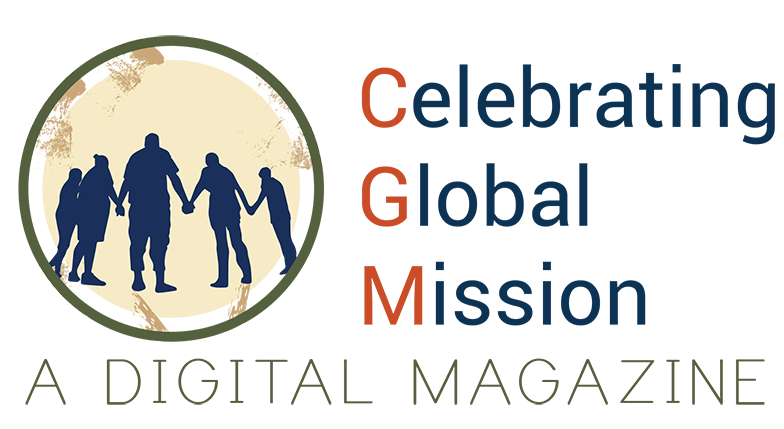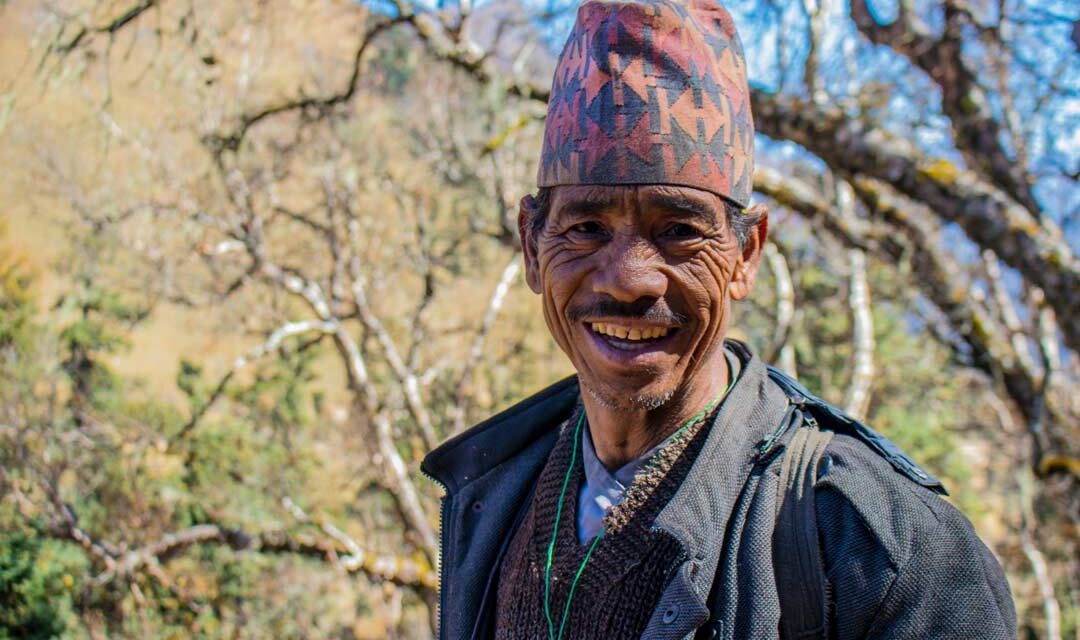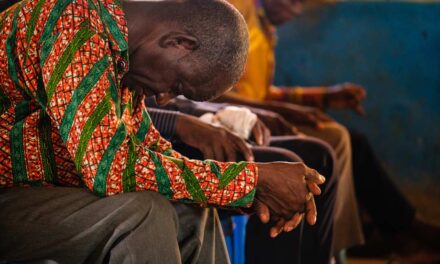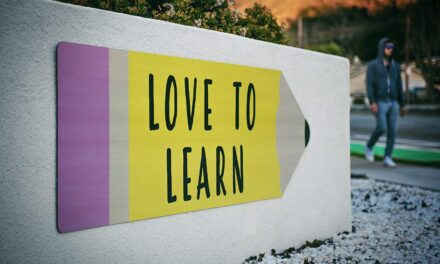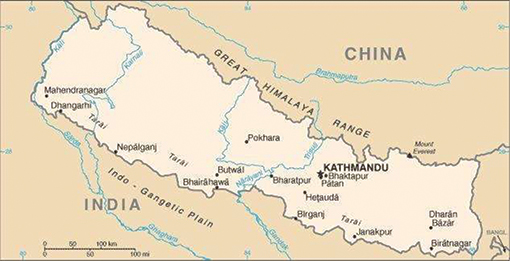
Nepal
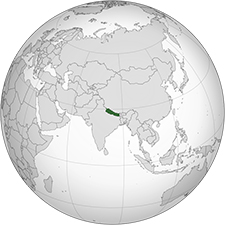
Nepal – global view
TOGETHER: HOLISTIC CHRISTIAN SERVICE THROUGH UNITED MISSION TO NEPAL*
*From UMNews article, December 2022; appeared in February 2, 2023 Together in Prayer, WMPL newsletter. Reprinted with permission. Some minor editing for local spelling differences and security.
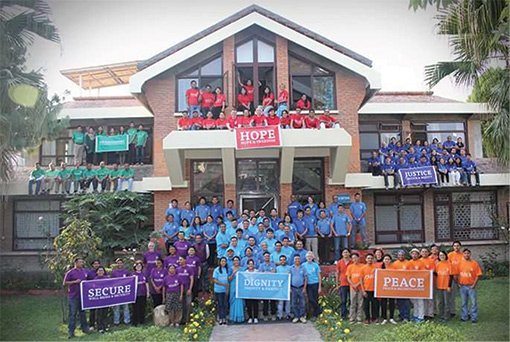
United Mission to Nepal
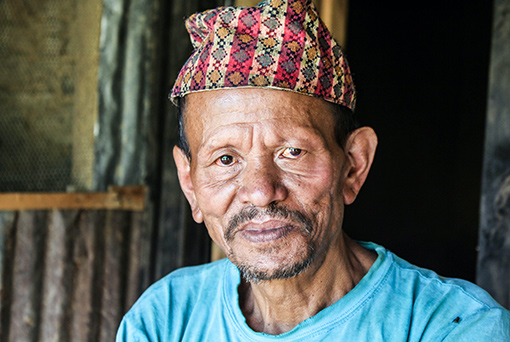
Nepali man (Photo by Suranjan Koirala on Unsplash)
“The birth of the United Mission to Nepal (UMN) in 1954 was an essential foundation for the initiation of that work to which the World Mission Prayer League had been called in the 1940s, that of reaching the unreached of with the love of Jesus. Today UMN is a cooperative effort between the people of Nepal and a large number of Christian organizations from nearly 20 countries on four continents. Multicultural teams of Nepali nationals and volunteer expatriate staff work alongside local organizations in less developed areas of the country, building partnerships that lead to healthy, strong and empowered individuals, families, and communities.”
— Chris McWeeny, UMNews editor
Sangsangai (translates as “together”) is a process of engaging churches through practical training based on Biblical principles, sharing a vision of why and how the local churches can work in their local community to demonstrate God’s love.
In the past year, pastors and leaders from 76 churches spread throughout all UMN localized areas have been trained in the principles and approaches of Integral Mission. They have learned about practically serving their local community.
Following Sangsangai training, several churches in very remote northern districts and along the border with India were inspired to respond to needs in their communities – including material assistance for families affected by a fire, financial support to widows and a girl with vision impairment, and educational materials for children from poor families.
UMN Integral Development Leaders
We asked: “What are the challenges you face while taking Integral Mission theology to the church? And why so?”
Response from Rajendra P., Integral Development Manager: “Firstly, the strongest barrier to the expansion of the theology and practice of Integral Mission in Nepali angsangai (translates as “together”) is a process of engaging churches through practical training based on Biblical principles, sharing a vision of why and how the local churches can work in their local community to demonstrate God’s love.
Secondly, the Nepali Church has a history of being persecuted and in some places is still experiencing persecution, so responding to the needs of the persecutors can be difficult to practice.
Thirdly, a greater emphasis on the spiritual realm of the Christian faith in teachings and missional practices and negligence of the social aspect of God’s mission has always been a great challenge from the beginning in the history of Christianity in Nepal.
Therefore, in UMN, we initiate our discourse of (Integral) Mission by digging out the biblical narratives. It takes time to lead Nepali churches to discover the depth of the biblical and theological foundation of a mission that is integral.
We asked: “How successful is the synergy between church leaders and community leaders?”
Response from Radha G., Integral Development Project Officer: “In most cases, the church finds it comfortable to confine all its activities within the four walls of the church building, owing to the theology of secular-sacred division. On the other hand, the community assumes that all activities carried out by the church in the community are the means of proselytization. The relationship between the two has always been affected by such assumptions.
Over the last 12 years, UMN has developed resources, tools and approaches that have helped shift the mindset of church leaders and local communities, helping them understand God’s mission as holistic. While it is an ongoing process, we have seen several successful examples of a local church and its community working together.”
We asked: “What encourages and inspires you to help churches work together with their communities?”
Response from Jiwan R., Integral Development Project Officer: “Primarily it is the vision of UMN – ‘fullness of life for all in a transformed Nepali society’ – that inspires me. I am always motivated to train church leaders to mobilise local churches who are the permanent agents of transformation. My heart leaps up with joy when I travel to UMN’s working clusters and see local congregations, which are small and may appear insignificant, doing great things to show God’s love to people in their communities. The changes taking place in mindsets and missional practices of local churches keep me inspired and motivated to move forward to train more churches on Integral Mission and its practical approaches like Sangsangai.”
*From UMNews article, December 2022; appeared in February 2, 2023 Together in Prayer, WMPL newsletter. Reprinted with permission. Some minor editing for local spelling differences and security.
Project Stories
Tin Trunk Libraries: Kris and Carol Gurung
“A couple of our young women have helped with tutoring village kids. Also, items in the Tin Trunk Library (TTL) books and blocks, etc., are available for community kids to use. The TTL contains over 100 books, an assortment for all ages. About 20 books are for teens and adults, but easy to read since many adults in the villages don’t read well. The adult books are on topics of interest, such as the value of learning to read, nutrition, encouraging girls to also get education, health, water and sanitation, etc. There were a few biographies for teens, some on science topics, and one on the geography and people groups in Nepal. The TTL also had maps of Nepal and a globe.
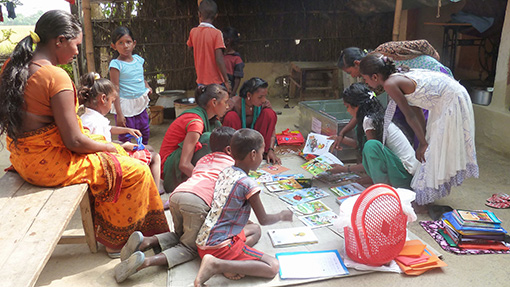
Neighborhood village kids looking at books from their new Tin Trunk Library
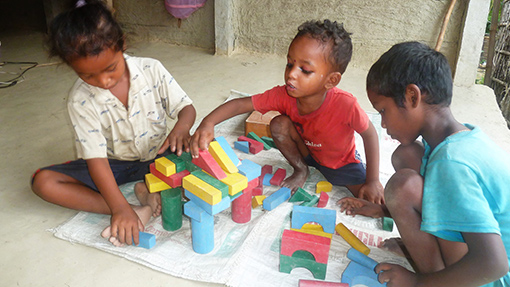
Three children playing with blocks from the Tin Trunk Library
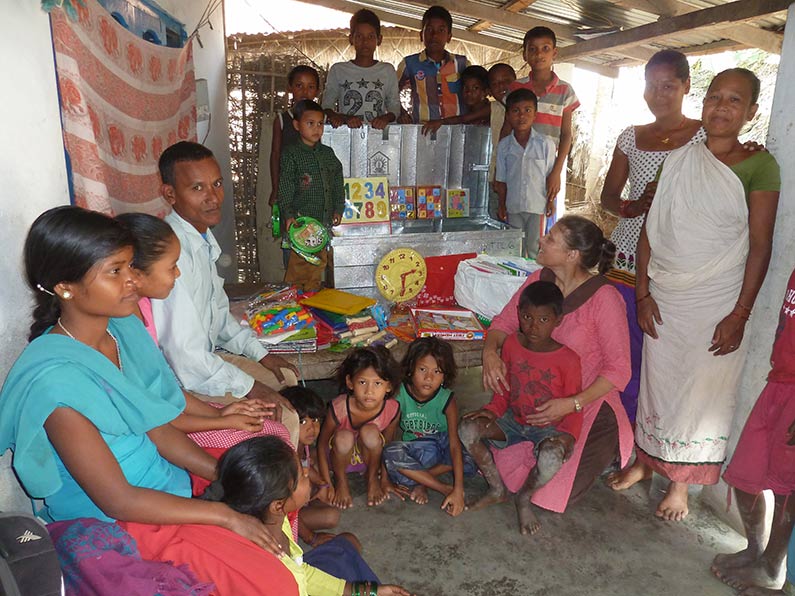
Villagers with their new Tin Trunk Library
Note: The Tin Trunk Libraries weren’t UMN-related (other than the set of adult easy-to-read books produced by a group that got its start in UMN before they became a separate business.) Also, the EQUIP people related to KISC – formerly under UMN – were the ones who helped with ideas of what to include in a TTL.
Building Bridges: A Story from Rupandehi
Bhim Bahadur Rana, 54, from Nawalparasi, pastors a small congregation in Khasuwa village. Bhim tells us about a very sad mishap in his village. “Last year, one student was swept away in the river when he tried to wade through the swollen waters. The suspension bridge constructed a decade ago had collapsed when the water level rose. Even after such a shocking accident we kept doing the same old mundane work, as if we had heard nothing,” recounts Bhim.
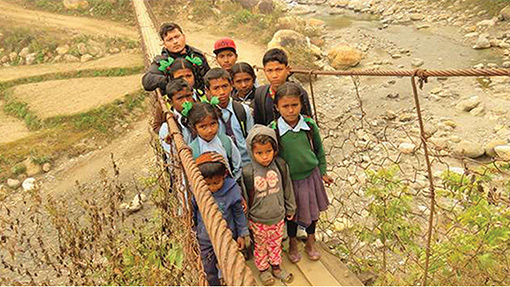
Bhim and children on new suspension bridge near Khasuwa village
He was troubled and wanted to do something about it. But, he believed the bridge should be fixed by the government and hesitated to take any action. Bhim explains, “We learnt that the mission of the church spins through social as well as spiritual spheres. Our journey in integral mission has made us realise we no longer have to wait for someone to care for our needs. So we decided to do something before we let one more student drown.”
Bhim has been involved in Sangsangai for the last two years as a facilitator where he has been teaching about the ways the church can serve the holistic needs of the community. “We offered to volunteer our resources, time and skills to repair the bridge. Some of us brought wooden planks or nails, and a few volunteered as carpenters. One thing led to another and in no time we completed the task,” shares Bhim, pointing proudly to the repaired bridge.
Bhim’s bridge story has spread through the village and people who use it every day can only thank him for making life so easy again. This has strengthened Bhim’s relationship with the local authorities. The local government has acknowledged his leadership and has also provided some funds for Bhim’s church. They have used this grant to bolster their worship centre.
Running Her Own Fruit Shop: A Story from Dhading
Empowered and honoured — that’s how 35-year-old Roshanti Gurung from Dhading District feels today. Inspired by a business training she received from UMN’s partner Dhading Christian Society (DCS), today she is successfully managing her own fruit shop.
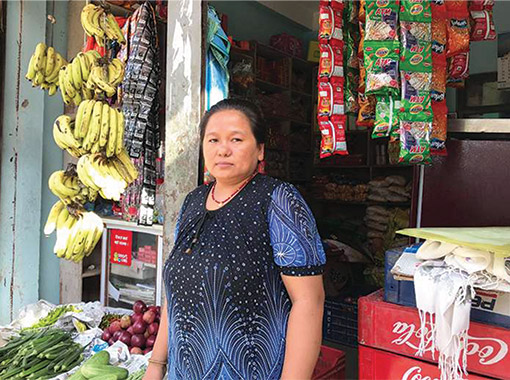
Roshanti at her fruit stand in Dhading District
Three years ago, Roshanti joined Vijaya Women’s Group, which was set up by Vijay Church. Yam Bahadur Tamang, the facilitator of the women’s group, recommended her to attend a business training. UMN partner DCS was running a training called “Start and Improve your Business.” Roshanti was eager to attend the two-day workshop. Through the training Roshanti learned how to choose the right business, what factors to consider for profit and how to create market links. She was also inspired by stories about people who had been successful in starting their own businesses.
Motivated by what she had learned, Roshanti made a plan to start her own fruit shop in her town. DCS was impressed by her plan and awarded her 3,000 NPR (approximately $26 USD) to start her business. From there she started her fruit shop and it’s been a success. On average she earns 1,000-2,000 NPR (8.50-17.50 USD ) each day. She’s been able to use this money to pay for the education of her children and to help pay for her family’s household needs. “I used to ask my husband for the smallest family needs,” says Roshanti. “Now I don’t have to bother him for petty things.”
Even more than this, Roshanti has learned a valuable lesson about her own independence and ability to contribute to her family and community. “Now the ladies in my women’s group count on me. They ask me questions and hope to learn from me. I feel empowered and honoured.”
Bamboo Bonanza: A Story From Sunsari
The Church of God, Madhumalla, is a small church of just 60 members. To do good work, we don’t always need a big number and lots of educated people or even an educated leader in the church. The neighbours of the church had a very negative attitude and hatred towards church members for no reason at all. Then, the church members did something remarkable for the community, and everything changed.
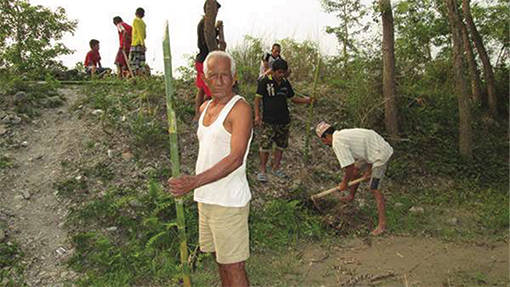
Members of the community and the church planting bamboo
Khagendra Magar, Deacon of the church, relates that people in the community had never ever thought that one day the church would do something that would tie church and community members together. After attending a training programme provided by UMN about Integral Mission and climate change, Khagendra led his church in this community project.
Church members and community people were suffering from floods in the nearby river, which affected their village. They had no idea how they could protect the village from flooding. Khagendra thought of planting seedlings along the bank of the river. The following year, the church itself produced seedlings and planted them on the side of the riverbank. The trees by now have protected the land from erosion. Moreover, the place looks beautiful because of the greenery around the river.
With the leadership and initiation of the church, the community has planted at least 600 seedlings already. Bamboo is both cost effective and easy to plant. It has two benefits. On one hand, it will grow faster and soon become big; on the other, in the future it can be sold to earn money. Considering these facts, this year the leadership of the church, along with the community have planted 300 bamboo seedlings. For this the church contributed around NPR 10,000 ($76 USD) and the rest of the money was provided by the community. People’s attitude towards church is much more positive now.
Note: Building Bridges, Running Her Own Fruit Shop and Bamboo Bonanza were written by Arjun Tamang, UMN Integral Mission Officer. Used with permission. Minor edits by CGM.
Rescue Network Nepal
Note: Condensed from report to RNN by Abikel Tamang, used with permission from Rescue Network Nepal. Photos courtesy of Steve Thorson for Rescue Network Nepal, http://rescuenetworknepal.org/

Rescue Network Nepal logo

Rescue Network Nepal 1st aid trainer and trainees
Rescue Network Nepal (RNN) — a project of WMPL — is an organization providing training and equipping the different community people living near highways or in remote areas. The goal is that in time of need, the trainees would provide first aid treatment to victims throughout Nepal, following the example of the Good Samaritan. RNN carries out all activities following its principle “Through the Church to the Community.”
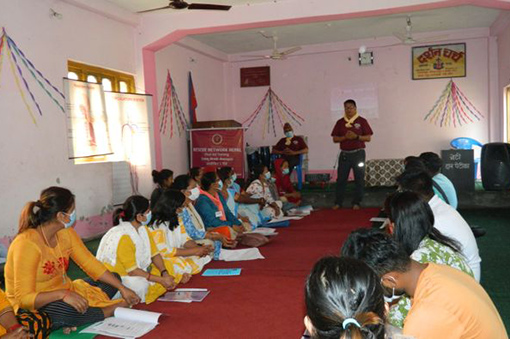
RNN trainer conducting a class for trainees
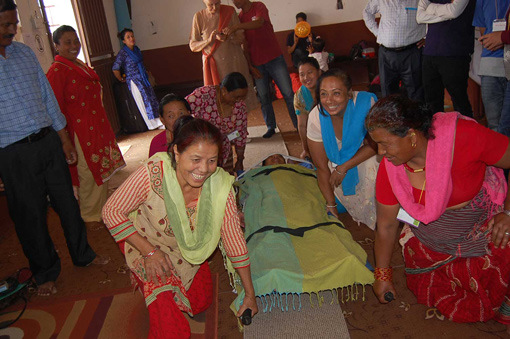
RNN trainees preparing to lift “injured” person on a stretcher
From mid-November 2022 – mid-March 2023, RNN trained 144 trainees from 7 training centers, involving 46 churches, social organizations, schools and colleges. RNN also distributed 5 first aid boxes and 5 stretchers and 10 first aid kits. During that same time period, 15 incident reports were provided by trainees who aided injured people (either in their family or in the community), using the tools and techniques taught by RNN.
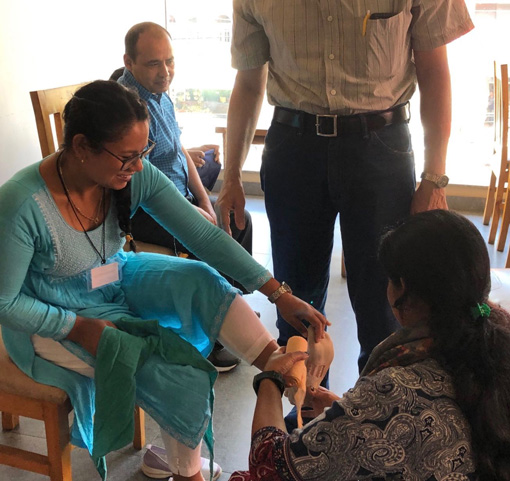
RNN trainees learning how to wrap a foot injury
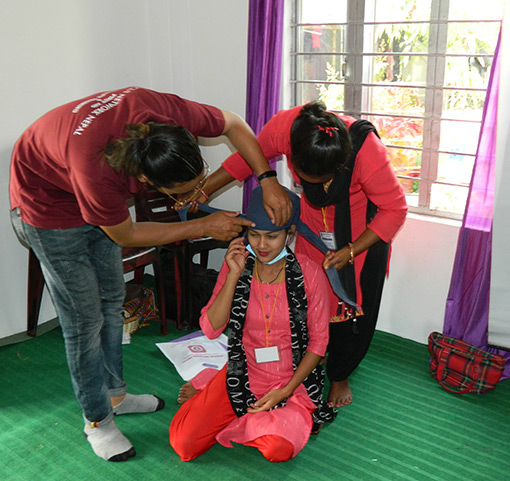
RNN trainer demonstrates a procedure
Incident Reports
One trainee, Jeevan Chaudhary, reported there was some construction work going on near his house. One of the laborers, who was drunk, tripped over an electrical wire, fell from the second floor and lay unconscious on the ground. People rushed toward him and were shouting for help. Jeevan went at the site and seeing the person who was unconscious, not responding at all, our trainee immediately started giving CPR and asked others to call an ambulance.
As he went on giving chest compression and breathing for 3 minutes the person regained consciousness. After that they made him rest for few minutes there until the ambulance arrived. The man only had minor head and limb injuries; he has recovered,is working in other construction sites, and has stopped drinking alcohol during working hours.
RNN local coordinators also report on providing first aid treatment to other people. Pastor Sabin Rai, of Dhankuta district (who also helps to coordinate for RNN trainings), informed us that he learned many things after seeing a RNN training.
One day his wife and children were having lunch and suddenly his daughter choked on the food. She was not able to breathe and his wife did not know what to do so, she was simply rubbing her back and trying to make her drink water. After few seconds, Pastor Sabin arrived and hearing what had happened, he immediately gave 15 back blows. The food choking the child was released and she was able to breathe properly. Because of what he learned at the RNN training, he saved his daughter’s life.
Trainees have also informed us that the certificate they received after the training has helped them to get proper jobs in other organizations. They said our certificate has helped to add value to their resume.
Pray!
Pray for God’s wisdom and guidance for the Integral Development Leadership Team (Rajendra, Jiwan and Radha) as they review and reflect on the existing integral development approaches and develop and design new church and community transformation approaches and projects in 2023.
Pray for the over 200 Integral Development facilitators, as they play a key role in influencing people for transformation.
Pray for the Lord to call expatriate workers with various professional skills and degrees to join with Nepali believers in the work and witness of United Mission to Nepal. Contact khilpert@wmpl.org for personnel needs and opportunities.
